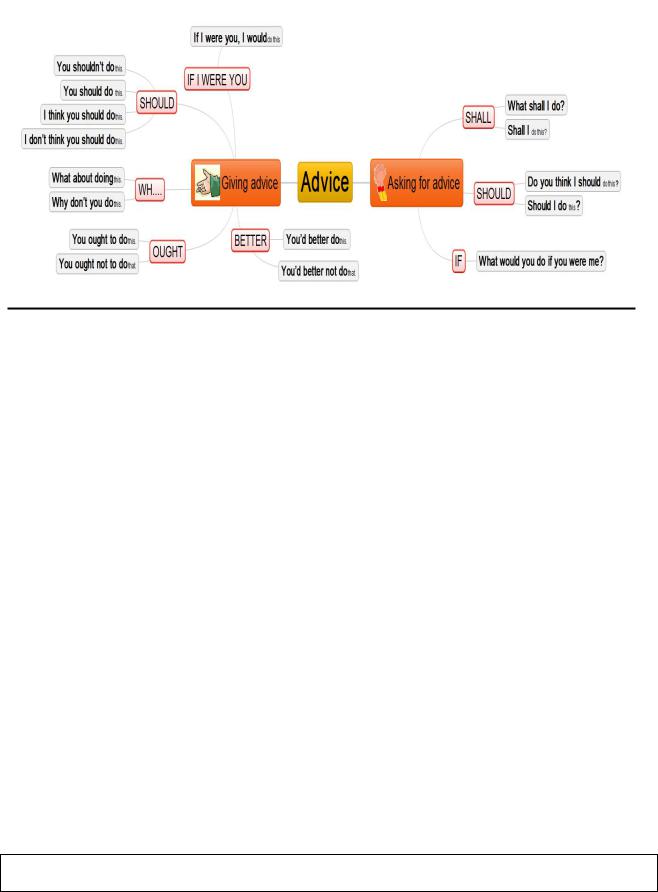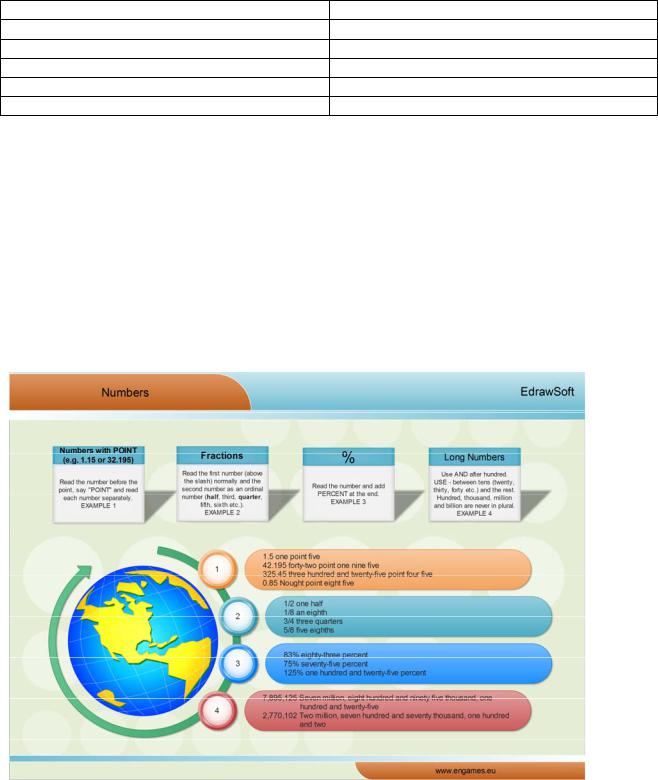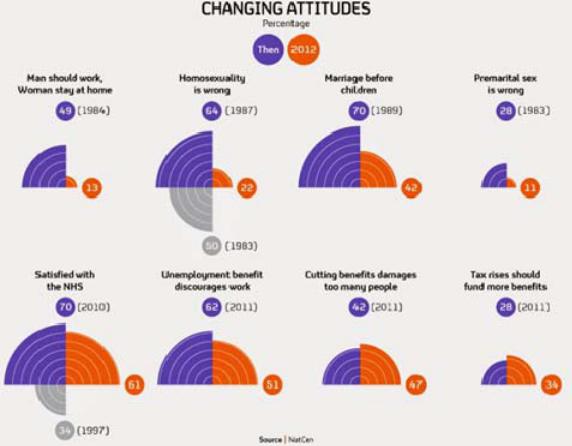
General_English_Semester_1_New_LAST_LAST_doc
.pdfWhen you are alone somewhere, for example in your room or under the shower, come up with sentences in the foreign language and speak them out loud.
Learn poems that you like and speak them out loud.
Expose yourself to the foreign language: listen to audio books, read books, watch films and videos, …
Look for a tandem partner, i.e. a person who speaks the foreign language and wants to learn your native language. Meet him or her regularly and speak the foreign language.
Use the computer and the internet to improve your speaking skills. For example you can listen to public podcasts in the foreign language, watch videos or chat with native speakers.
Work on your pronunciation.
(From http://www.learning-english-online.net/skills/speaking/speaking-strategies/)
Speaking
1. Split into groups. Study counter-arguments to the text you have read and discuss the problems using both the arguments of the text and the counter-arguments that follow. Group A supports youth. Group B supports older generation.
The young do not seek responsibility: they evade it.
They are not interested in important questions; avoid involvement: e.g. major political issues; they lack noble ideas.
They want expensive clothes, cars, etc. without working for them.
The young should be grateful to the older generation. The older generation provides the young with good education, money to spend.
The older generation fought World War 2, faced difficult, sometimes tragic problems. The young have had everything easy.
The young cling to passing fashions: clothes, pop music, and rock music. The modern phenomenon is mass hysteria.
Appearance of many young people is unpleasant: too long unkempt hair, dirty clothes, and unwashed bodies.
Communicating
Giving advice refers to when we tell other people what we think could help them. The most common way to give advice is by using the modal verb 'should'. There are also other forms including, 'ought to' and 'had better' which are more formal. You can also use the second conditional to give advice.
There are a number of formulas used when giving advice in English. Here are some of the most common:
You should … .
I don't think you should … .
You ought to work less.
You ought not to … .
If I were you, I'd … ..
If I were in your position, I'd … .
If I were in your shoes, I'd …. .
You had better … .
You shouldn't … .
Whatever you do, don't … .
( From http://esl.about.com/od/grammarstructures/a/f_advice.htm)
43

1.Tell the class what you think about the parent-child relationship. What should it be like?
What is the way to achieve a perfect mutual understanding?
Writing
Self study http://learnenglishteens.britishcouncil.org/skills/writing-skills-practice/informal- email
Write a short email to your friend about your relations with parents.
3.2 About Teenagers
Lead in
What is a teenager?
A teenager is....
a person who can't remember to walk the dog but never forgets a phone number;
someone who can hear his or her favorite singer 3 blocks away but not their mother calling from the next room;
a whiz who can operate the latest computer without a lesson but can't make a bed;
a connoisseur of 2 kinds of fine music -loud and very loud;
an original thinker who is positive that his or her mother was never a teenager;
a romantic who never falls in love more than once a week;
a student who spends 12 minutes studying history and 12 hours studying for his or her driving license.
What definition do you like most? Which one describes you? Which suits to all teens best? How would you describe a teenager?
Reading and vocabulary Check the words in the box
●reach the age● join the army ●develop ●work full time ●premise ● helpful ● constructive ●hardworking●caring ● preoccupation
44

1. Skim the text to grasp the general idea
WHAT IS A TEENAGER?
Officially, of course, a teenager is anyone aged from thirteen to nineteen inclusive but most people would probably think first of all of a younger age group and exclude 18 and 19 year olds. After all, once you reach eighteen you can vote, get married without your parents permission and join the army, so it seems logical that you are considered as an adult rather than a child. At the other end of the scale, children are growing up and developing more quickly and these days 11 and 12 year olds would like to include themselves in the ‘teenager’ group. In actual fact they have their own group title now – ‘Pre-teens’ or sometimes ‘Between-agers’.
Without getting hung up on actual ages, perhaps what we really mean by ‘teenagers’ are people who are in the stage of their life when they are developing from children into adults. This is really a 20th century idea because in the old days children used to grow up much more quickly, with boys working full-time at the age of eleven or twelve and girls either working or helping out with younger children. In many parts of the world this is still the case.
Are teenagers a problem?
Parents and grandparents always seem to start from the premise that teenagers are in a special category when it comes to defining the human race. According to ‘the older generation’ teenagers are lazy, they wear ridiculous clothes and are appallingly rude to their betters and elders; they find it impossible to be polite, helpful, constructive, caring or hardworking. What’s more, they spend all their time listening to awful music (“It isn’t music, it’s a collection of horrendous noises!”) and watching unsuitable films. And all they ever think about is parties, drugs and sex. Well, that’s how the sto-
ry goes! But is it anywhere near the truth?
Actually, it seems to me to be quite the opposite of the truth. Teenagers spend a lot of time thinking about their work (studies), their families and friends and their hobbies. Sure, there are certain preoccupations such as clothes, money, how to behave in a certain situation, their bodies.
But isn’t it the same for most people? So what about the myth that all teenagers are rude, selfish, lazy and greedy? As far as I’m concerned, it’s nonsense. The vast majority of young people I meet are polite, friendly, open, interested and hard-working.
Do teenagers have problems?
You might as well ask “Do hens lay eggs?” Teenagers are human, so of course they have problems. And the problems aren’t very different from anyone else’s.
What’s going to happen at work/school tomorrow? Why does Dad like my sister better than me?
Am I too fat/skinny/tall/short etc.?
Does my boyfriend/girlfriend really like me? How can I afford to buy….?
Am I stupid?
There isn’t anyone alive in the world who hasn’t posed these questions. We usually do it when we turn out the light and lie down in bed at night and the answers aren’t very satisfactory! It’s true, of course, that sometimes teenagers have special problems. It is a difficult time because it is a period of transformation. It isn’t quite as bad as a chrysalis changing into a butterfly but it may seem like it – or even the other way round! It isn’t easy to grow up and the physical and emotional
45

changes are often confusing and worrying. But it’s my impression that most young people cope rather well.
2. Scan the text and fill in the table |
|
Myths about teenagers |
Reality |
3. Read the text once again and complete the sentences.
1)By teenages we mean … .
2)In the old days children used to grow up … .
3)According to ‘the older generation’ teenagers … .
4)The author thinks that … .
5)There are certain preoccupations such as … .
6)The vast majority of young people … .
7)The author finds teenagers … .
8)It’s true, of course, that sometimes teenagers … because … .
Grammar spot
1. Go to Grammar Focus to revise the material about numerals
46

2. Describe how social attitudes have changed in Great Britain
Improve your study skills
Tips for writing a summary
1)First, read the text or article to get a general idea of the subject matter as well as the author's attitude.
2)Then read through a second time to identify the main points – either paragraph by paragraph, or heading by heading / sub-heading.
Identify the topic sentences. These are usually the first sentences of each paragraph. They give the main idea for the paragraph (with the following sentences supporting this main idea). Also look for the concluding sentence in the paragraph, as this often summarises the paragraph.
3)Now write the main idea of each paragraph (or section) in one sentence. Use your own words, rather than the author's words. This is important: if you copy what the author has written, you risk writing too much!
4)Start pulling out key facts or findings from the text which support the author's main idea (or ideas). You may need to either summarise these (if there are a lot of them) or decide which are the most important or relevant.
However, if you are summarising a number of texts or articles, start to look for common themes running through all the texts. Are the texts broadly in agreement, or do they have different points of view or findings? Choose only a few supporting details to illustrate similarity or contrast.
5)When you have written all your sentences, you should be able to get a good overview of the whole text. This overview can be your introduction to your summary. In your introduction, you'll also need to give the author's name and the title of the text you are summarising.
47
Your summary should now look like this:
Text / author information
Your overview (the introduction)
The single sentences summarising the main ideas, with the key facts or figures that support the ideas.
6)At this point, you'll need to organise all the information in the most logical way. You might also have repeated ideas or details that you'll need to delete.
7)Don't forget to include linking words so your reader can easily follow your thoughts. This will help your summary flow better, and help you avoid writing short sentences without any connection between them.
Important points to remember
Don't copy the article. Instead, paraphrase. For example, “the author claims / states / suggests …”
If you quote directly from the original text, use quotation marks. (Minimise how often you do this.)
Don't give your opinion.
Edit what you write. Check your English grammar, spelling and punctuation mistakes.
(From http://www.english-at-home.com/business/how-to-write-a-summary/)
Writing |
|
|
1. Make up a summary of the text. Use the following phrases |
|
|
The article is headlined…. |
– Статья называется… |
|
The headline of the article |
– Название статьи, которую я прочитал… |
|
I have read is… |
|
|
The author of the article is… |
– Автор статьи… |
|
The article is written by… . |
– Статья написана… |
|
It's published in… |
– Она опубликована… |
|
It's printed in… |
– Она опубликована… |
|
It's printed in… |
– Она напечатана… |
|
The main idea of the article is… |
– Основная мысль этой статьи… |
|
The article is about… |
– Статья о… |
|
The article is devoted to… |
– Статья посвящена… |
|
The article deals with…. |
– Статья связана с … |
|
The article touches upon…. |
– Статья затрагивает… |
|
The purpose of the article is |
– Цель статьи – ознакомить |
|
to give the reader some information on… |
читателя с … |
|
The aim of the article is to provide |
– Цель статьи ознакомить |
|
the reader with some material |
читателя с материалами/данными о… |
|
(data) on…. |
|
|
The author starts by telling the reader that |
– В начале статьи автор пишет … |
|
The author writes (states, stresses, thinks, |
– Автор пишет, (утверждает, |
|
points out) that … |
подчеркивает, полагает, |
выделяет), |
|
что… |
|
The article describes … |
– Статья описывает … |
|
According to the text ... |
– Согласно тексту… |
|
Further the author reports (says)… |
– Далее автор сообщает… |
|
It is important to note (stress, underline)… |
– Важно отметить, (подчеркнуть)… |
|
In conclusion…. |
– В заключение… |
|
The author comes to the conclusion |
– Автор приходит к |
заключению, |
that… |
что… |
|
48
Speaking
Discuss the following
1)Should parents restrict their children freedom? Do you think teenagers have too much freedom in our country?
2)In Russia you may see many teenagers in the streets late at nights? What are they doing there? Is it safe?
3)Sometimes teenagers find it difficult to communicate with their parents. Why? Who should help teenagers to solve the problems? Could parents be helpful? How should parents communicate with their teenage children? Should they try to share their interests, pop music for instance?
4)Would you agree that these are some of the important problems of teenagers? “Who am I”, “I’m bored”, “They don’t understand me”, “People are laughing at me”, “I don’t know what to do”, “I haven’t any good friends”.
5)Some teenagers try hard to distinguish themselves by wearing unusual clothes, or having unusual habits. On the other hand, some teenagers tend to unification wearing similar clothes; having similar, following similar behavioural patterns habits. Give examples.
6)Many teenagers are ready to take part in different protest actions. Why? Are they really interested in politics? What are they protesting against?
7)Are there any political organizations for teenagers in Russia?
Project work.
Surf the Internet to find material about youth organizations in Russia and abroad. Make presentations. Discuss
3.3 The Problem of Self-Realization
Lead in
What is self-realization? What is necessary for a person to realize him/herself? Is it possible to realize oneself nowadays?
Do you know any institutions that might help young peoples to develop their talents and make good use of their spare time ?
Did you attend any vocational classes (musical, sport, dancing, chess, etc.) when you were at school?
Reading
1. Scan the text and point out the activities teenagers are engaged in.
Working teens
Name: Sarah Williams Age: 18
Job: Play Scheme Assistant
Hours: 38 per week in the summer holidays Pay: $ 6. 50 per hour
“I love working with children and I want to become a teacher after university. Working on a play scheme is fun and good work experience. I don’t need the money as my parents give me a good allowance of $100 a month. I work for 6 weeks during the summer. About 80 children come to the Youth Centre every day. In the Centre there are 6 Assistants like me, and a Play Leader. We prepare activities like painting, drawing and crafts. We also organize games in the afternoon. This year it is my responsibility to take children on a trip to the zoo.”
49

###
Name: Keith Lewis Age: 17
Job: Babysitter Hours: 10 per week Pay: $ 5. 00 per hour
“This is the best job in the world. My parents have many friends with younger children. They call me when they want to go to a restaurant or pub for the evening. When I arrive the children are usually already in bed. I sit in the living room and watch TV. The children almost never wake up, and anyway they are not usually babies, so I just can tell them to go back to sleep. The best thing in this job is that I don’t need to pay any extra money – it is all cash-in-hand.”
###
Name: Tom Maxwell Age: 15
Job: Fast-food Restaurant Worker Hours: 8 per week
Pay: $ 4. 50 per hour
“I love this job. It’s never boring because you are busy all the time. You can talk with your colleagues and have fun while you work. You also can get discount on the food here. I have to say that I am not so keen on burgers now I have been working here for 6 months. My job is a Saturday job. I am saving to buy a car when I am seventeen.”
Speaking
Discuss the following.
Have you ever taken any jobs?
At what age are young people allowed to work abroad/in Russia? What jobs can they get?
What kinds of jobs are available for students abroad/in Russia?
Communicating. Asking for information
Asking for information can be as simple as asking for the time, or as complicated as asking for details about a complicated process. In both cases, it's important to use an appropriate form to the situation. For example, when asking for information from a friend, use a more informal form. When asking a colleague, use a slightly more formal form. Finally, when asking for information from a stranger, use an appropriately formal construction.
50
Asking for Information
Very Informal - for Friends and Family
Simple Question: Wh? + Helping Verb + Subject + Verb
If you are asking a friend or family member for information, use a direct a question.
How much does it cost? Where does she live?
More Formal for Everyday Simple Questions
Use these forms for simple, everyday questions in stores, with colleagues at work, and in other informal situations.
(Pardon me, Excuse me) Can / could you tell me + wh? + S + verb?
Can you tell me when the train arrives?
Pardon me, could you tell me how much the book costs?
Formal for More Complicated Questions and Asking Important People Questions
Use these forms when asking complicated questions that require a lot of information, as well as asking information questions of important people such as your boss, on a job interview, etc.
I wonder if you could + tell me / explain / provide information on ...
I wonder if you could explain how health insurance is handled at your company. I wonder if you could provide information on your pricing structure.
Would you mind + verb + ing ...?
Would you mind telling me a little bit more about benefits at this company? Would you mind going over the savings plan again?
Replying to a Request for Information
If you would like to provide information when asked for information, start your reply with one of the following phrases.
Informal
Sure
No problem. Let me see ...
More Formal
I'd be happy to answer that.
I should be able to answer your question. It'd be a pleasure to help you.
When providing information people will sometimes also offer to help in other ways. See the example conversations below for an example.
Saying No
If you do not have the answer to a request for information, use one of the phrases below to indicate that you are unable to answer the question.
Informal
Sorry, I can't help you out. Sorry, but I don't know that. That's beyond me.
More Formal
I'm afraid I don't have the answer to that question.
I'd like to help you. Unfortunately, I don't have that information / don't know.
Saying 'no', is never fun, but sometimes it's necessary. It's common to offer a suggestion as to where someone might find out the information required.
(from http://esl.about.com/od/smalltalk/a/Asking-For-Information-In-English.htm)
51
Role play
Group work. Split into groups.
Group A. Presents job vacancies for students offered by youth centres/state/business/non-profit organizations.
Group B (students). Asks questions about job requirements, employment and working conditions, salary.
Reading for Information
Culture clip
Are Britain’s Teenagers the Worst in Europe?
New research, conducted by the Institute for Public Policy Research (IPPR), shows that British young people are the worst behaved in Europe!
‘HANGING OUT WITH MATES’ is what teenagers do in the UK. In England and Wales, 45 % of 15-year- old boys spend most evenings out with their friends. In Scotland, the number is 59%. But in France, only 17 % of teenagers go out with their mates at night. In Portugal this figure stands at just 7%.
Only Ukraine ranked higher than Scotland, with 60% of boys and 40% of girls spending four evenings or more a week with their friends.
Lots of British teens don't sit down for meals with their parents. In Italy, 93% eat regularly with their families. In France, 89% eat at home. But only 64% of British teenagers eat meals at home.
According to IPPR, British teens get drunk more often and get involved in more fights than teens in other countries. They are also more aggressive and more anti-social.
Researches think that teenagers in Britain are more out of control because they have less contact with adults, especially parents, than in the rest of Europe.
Police in Britain have tried to control troublesome teens through anti-social behaviour orders, known as ASBOs. These orders are a special set of rules which are given to someone whose behaviour is causing problems. The orders can be handed out for graffiti, noise, throwing things, being with known gang members. Kids and teenagers who receive ASBOs can have their names made public — on ‘walls of shame’! However, for many teens earning ASBO attention is a matter of pride.
There have also been attempts to control what young people wear. Many shopping centres in the UK have banned hoodies because 'it's a fashion worn by potential criminals who don't want to be recognized on surveillance cameras.' The government and the Prime Minister, Tony Blair, have publicly backed the decision. But teenagers and civil liberties groups say that this is discrimination and that the government 'confuses fashion with behaviour.' They take part in all sorts of protests and continue to wear hoodies. And they DON'T AGREE that they are the 'worst in Europe'!
Would you believe it?
A 16-year-old boy from Manchester has been given an ASBO that bans him from wearing a hooded top for five years! The ASBO also bans him from meeting more than two people at once, apart from his family.
In February 2006, a 58-year-old teacher who was wearing a hooded top was asked to take it off when he entered a big supermarket in Swindon. “I was wearing the hood because my hair was a mess,” he said. The shop said it was taking action to 'make sure this doesn't happen again.'
Lady Sovereign, a famous British rapper, has started a campaign called 'SAVE THE HOODIE'. 'Wearing a hoody doesn't make it a criminal or gang member,' she says. If someone commits a crime it's not about what they wear, it's about a person wearing it. A criminal is a criminal no matter what they wear... Don't blame the hoody; you should be able to wear what you want!
52
